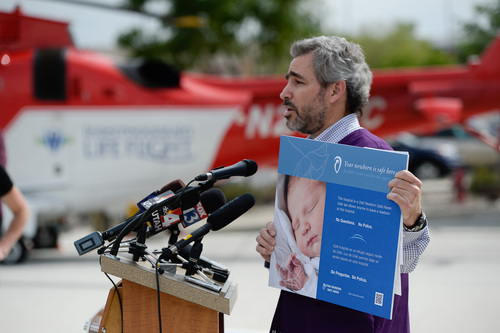This is an archived article that was published on sltrib.com in 2014, and information in the article may be outdated. It is provided only for personal research purposes and may not be reprinted.
No questions asked.
Those are three words that can save a life. Life in its most precious and vulnerable state.
Laws in all 50 states provide that a woman who has given birth to a child that she does not want or cannot care for can surrender that child to state custody at a specified place — usually a hospital — and walk away with no questions asked.
Those statutes, known as Safe Havens laws, were enacted in a wave that began in Texas in 1999. They were a clear-eyed and humane reaction to what was then perceived as a rise in infant abandonments that far too often left the baby dead and the mother either alone with her conscience or in police custody.
But, as with most laws, just passing a bill and handing out commemorative pens at the signing ceremony doesn't do nearly all the work that has to be done.
Just this week in the Salt Lake City suburb of Kearns, a woman has been arrested and her infant daughter clings to life in a local hospital. According to police, the woman gave birth alone, after having hidden her pregnancy from even her own parents, whom she lived with.
After two days of not seeking care for herself or the baby, the woman left the infant in a neighbor's trash dumpster. Where, if it hadn't been for a sound that the neighbors thought might be a wailing cat, the child likely would have died.
It is not clear whether the mother of this child was not aware of Utah's Save Haven law or whether her fear of being judged by others meant she was too scared to take advantage of it.
What is clear is that more should be done to get the word out. There have been ad campaigns, including signs on UTA buses and trains. The Utah Newborn Safe Haven organization offers help through its website — http://www.utahsafehaven.org — and operates a 24/7 information line — 1-866-458-0058.
Utah might also follow the lead of several other states and designate a larger list of acceptable places where newborns may legally be abandoned, such as fire stations, police stations and with any emergency medical crew.
Of course, everyone would be better off if the whole of Utah culture got to work to create an environment where accurate and complete sex education and access to contraceptives are common and where judging the sexual behavior of others is rare.
Many good people in Utah fear the oversexualization of society and a loss of so-called traditional values. There are many unwise sexual decisions being made every day, often under the influence of alcohol, or just the fearlessness of youth.
But it is still the stigma attached to normal human behavior, the fear of being judged, and not licentiousness, that drives sad and lonely women to abandon their children.



